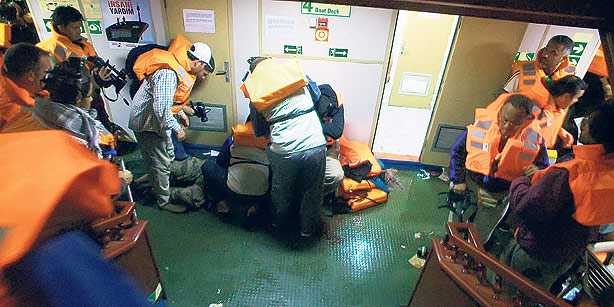| A former deputy chief of Israeli intelligence agency Mossad has said his country should take the first step in mending ties with Turkey over Israel’s attack on an international aid convoy in late May. | |
Denying, however, that Turkey’s demands for an apology and compensation for the families of those killed in the attack are appropriate, Ilan Mizrahi, in an interview with Sunday’s Zaman last week in İstanbul, said Israel should rather make a gesture to ease the present tension in between the two countries. “I would prefer and suggest that some kind of gesture, not an apology, should be initiated by Israel,” he noted during the interview. He did not specify as to what that “gesture” might be.
 Mizrahi spent over 30 years at Mossad as an intelligence officer starting in 1972 and became the agency’s deputy director in 2003. He was later promoted to head the country’s National Security Council (NSC) in 2006 under then-Israeli Prime Minister Ehud Olmert for about a year and a half. Turkey, which was Israel’s closest ally in the region for decades, has grown increasingly critical of its policies beginning in late 2008 when Israel launched the 22-day-long Operation Cast Lead in the densely populated Gaza Strip, which is home to an estimated 1.5 million people in an area of only 360 square kilometers. The operation began at a time when Turkey was mediating peace talks between Israel and Syria and only days after then-Israeli Prime Minister Ehud Olmert visited Turkey and met with his Turkish counterpart, Recep Tayyip Erdoğan, in Ankara. As a result of the operation, over 1,400 Gazans, almost half of whom were women and children, were killed. Not long after that fatal Israeli military intervention, Erdoğan left a panel at the World Economic Forum (WEF) in Switzerland after lambasting Israeli President Shimon Peres for the killings. A year later, Israeli Deputy Foreign Minister Danny Ayalon summoned the then-Turkish ambassador in Tel Aviv, Oğuz Çelikkol, and had him sit in a lower seat than his own with only the Israeli flag on the table, denying him a handshake before the press. And lastly came the Jewish state’s flotilla attack in May 31 of this year when Israeli naval commandos boarded an aid convoy carrying humanitarian supplies to impoverished Gaza — on which Israel and Egypt are imposing a severe blockade — killing eight Turkish and one Turkish-American civilians. Turkey withdrew its ambassador over the attack and still has reduced representation in the Israeli capital. ‘Putting Israeli policies in Red Book a hidden ultimatum’ On the specific issue of the flotilla attack, Mizrahi said if the two countries come together and discuss how to overcome the problem he is “sure they will find a formula.” However, the retired intelligence and security manager who refused to be photographed by Sunday’s Zaman because of his background also noted that he is not optimistic for overall Turkish-Israeli relations. The reason for him to have very little hope to that end is Turkey’s recent decision to put Israel’s instability-inducing actions in the Middle East as a threat in its National Security Policy Document (MGSB), or as it is more commonly known, the Red Book. Mizrahi said he had positive meetings at the Turkish Embassy in Tel Aviv before he came to Turkey, but his impression has changed with that latest development. “What made me really pessimistic is your Red Book. This was a shock to me. It makes me understand that maybe nothing will help on your side,” he said, adding that the act was “a hidden ultimatum.” “The flotilla issue should not be the case [for arriving at] the present bad relationship between the two countries. We want very much to have good relations with Turkey, but if Turkey does not want it, then let it be. We will survive. We are a strong nation,” he also said during the interview. Mizrahi, however, later drew a very thin line and switched from putting the entire blame for the bad relations on the Turkish government. “I would be a fool to think that what happened is only because of the new policy. My government made mistakes, your government made mistakes. We are all making mistakes. I don’t know any country or government that does not make any mistakes. Nobody is immune from mistakes but the pope in the Vatican,” he explained. “I have huge respect for your government and security and intelligence agency,” he also said, further expressing his feelings and past efforts for Turkey as: “I am friend of Turkey. I love Turkey. I respect Turkey. When I was heading the NSC, I was pushing for a dialogue with Syria via Turkey and also pushing the very strong Israeli community in Washington to do their best vis-à-vis Europe to accept Turkey to the European Union because I thought it was the right thing to do. So I care about Turkey, I care a lot about my country. I am very unhappy to see the present situation.” When asked what the mistakes are that the Israeli side made, which apparently caused its bilateral relations with Turkey to sour to historic lows, he said Olmert’s visit just a few days before Operation Cast Lead was launched was one of them “because it might have given the impression that the operation was coordinated.” Answering the same question, he added that “the humiliation of the Turkish ambassador was also a mistake.” He, however, said both Operation Cast Lead and the flotilla attack were justified. When asked if he also thinks the operation in Gaza almost two years ago was successful, he said it is too early to make a judgment. “To make a real judgment, it will be a huge mistake to do it immediately after the operation. You have to have several years to do that. We can talk if an operation in 2006 was successful or not only now,” he explained. |
Israel should take first step to settle flotilla issue


Leave a Reply